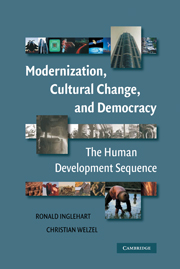Conclusion: An Emancipative Theory of Democracy
Published online by Cambridge University Press: 05 September 2012
Summary
Socioeconomic development brings increasingly favorable existential conditions and diminishes external constraints on intrinsic human choice. Favorable existential conditions contribute to emerging self-expression values that give individual liberty priority over collective discipline, human diversity over group conformity, and civic autonomy over state authority. The emergence of these values transforms modernization into a process of human development in which the underlying theme is the growth of autonomous human choice, giving rise to a new type of humanistic society that has never existed before. Rising self-expression values provide a social force that operates in favor of democracy, helping to establish democracy where it does not yet exist, and strengthening democracy where it is already in place, improving the effectiveness of democratic institutions.
Mere formal democracy is linked with the emancipative thrust of rising self-expression values, but genuinely effective democracy is even more strongly tied to it. Elite integrity makes the difference between formal democracy and effective democracy – between democracy in name only, where elections are held and where civil and political liberties exist on paper but the governing elites feel free to ignore people's rights and govern on their own behalf; and democracy that is genuinely responsive to mass preferences and respects people's civil and political liberties. For elite corruption can make the best democratic constitution meaningless, rendering people's civil and political liberties ineffective. And elite integrity, itself, is largely determined by the strength of self-expression values in the society.
- Type
- Chapter
- Information
- Modernization, Cultural Change, and DemocracyThe Human Development Sequence, pp. 299 - 300Publisher: Cambridge University PressPrint publication year: 2005



